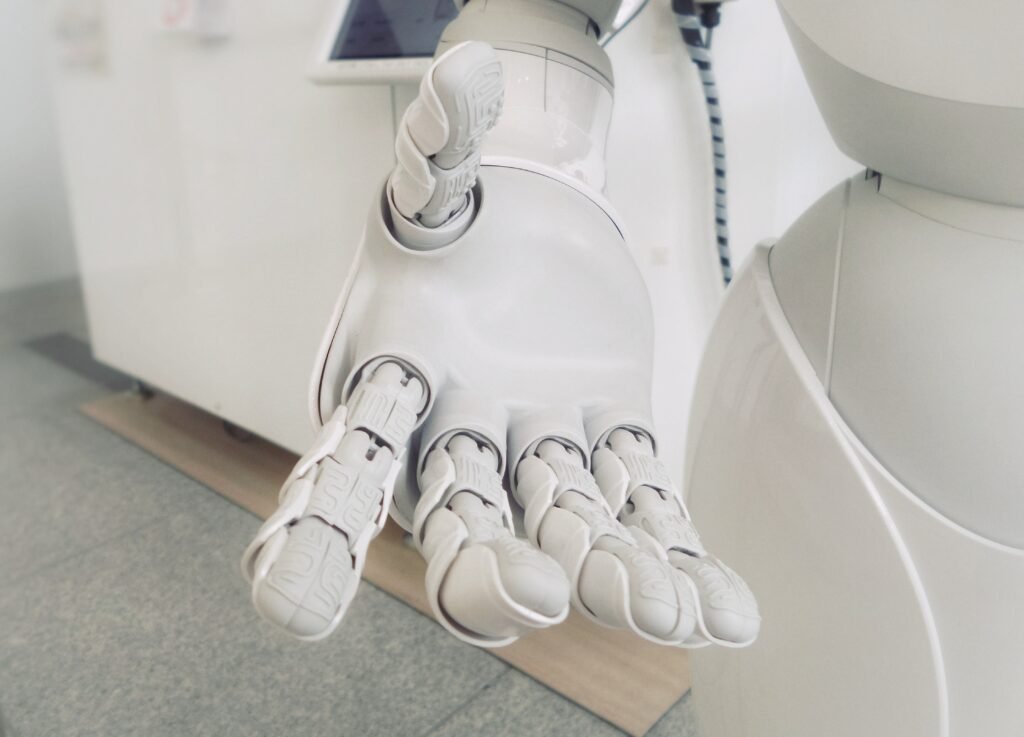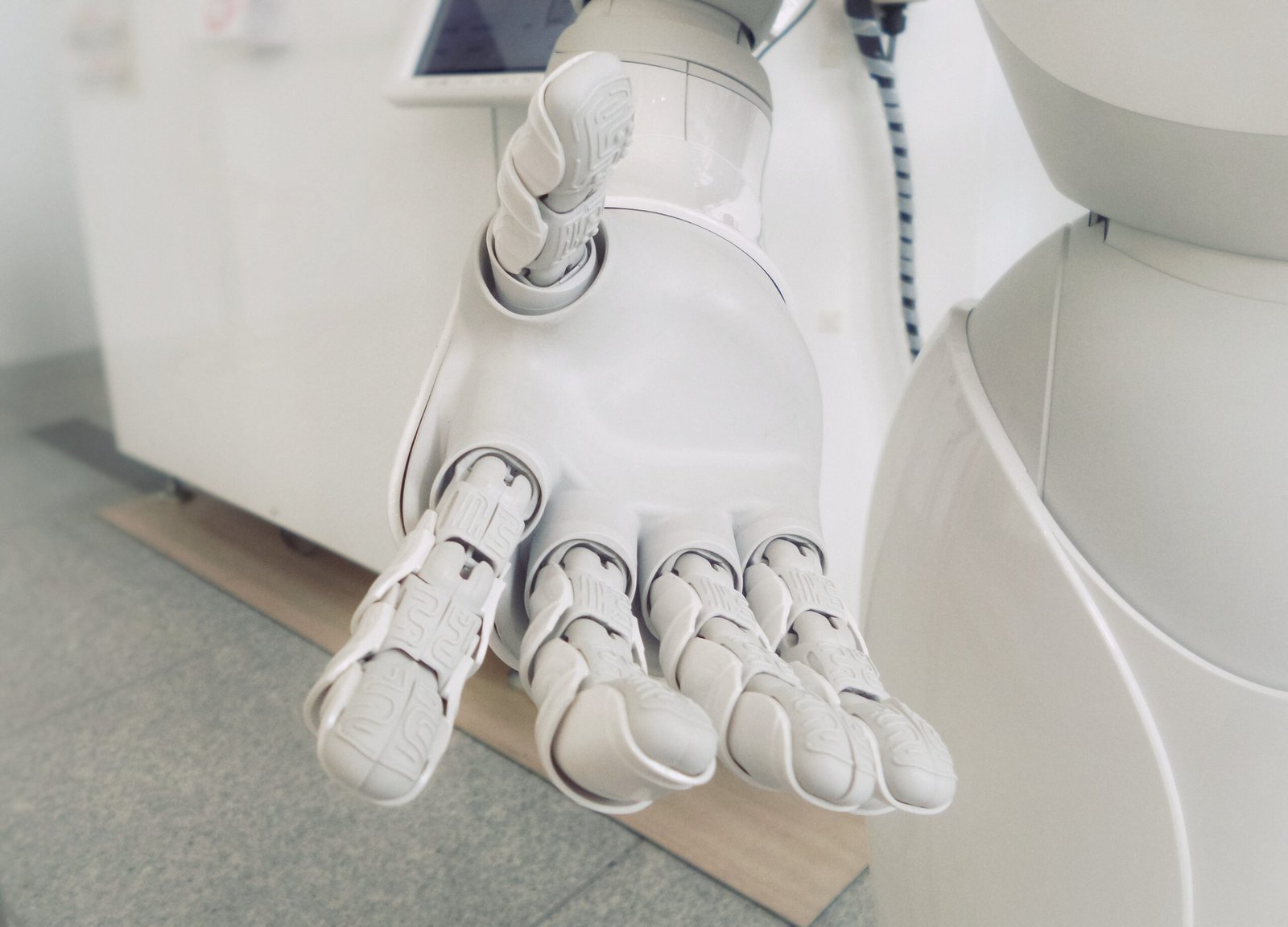Have you ever wondered how artificial intelligence (AI) is revolutionizing the world we live in? From self-driving cars to personalized recommendations on streaming platforms, AI is becoming an integral part of our daily lives, transforming industries and reshaping the way we interact with technology. This article will explore the remarkable ways in which AI is changing the world, revolutionizing everything from healthcare to transportation, and offering unprecedented possibilities for the future. So, buckle up and get ready to discover the incredible impact of artificial intelligence on our world.

Transforming Healthcare
Artificial intelligence (AI) has the potential to revolutionize the healthcare industry in numerous ways. From improving diagnosis and treatment to enhancing patient care and experience, AI is making significant advancements in this field.
Revolutionizing diagnosis and treatment
AI is transforming the way healthcare professionals diagnose and treat diseases. With the help of machine learning algorithms, AI can analyze large amounts of data and identify patterns that humans might miss. This enables earlier and more accurate diagnosis, leading to better treatment outcomes.
AI can also assist in predicting potential health risks. By analyzing a patient’s medical history, genetic information, and lifestyle factors, AI algorithms can identify individuals who are at a higher risk for developing certain diseases. This allows healthcare providers to take proactive measures and provide personalized preventative care.
Enhancing patient care and experience
AI-powered technologies are improving the overall patient care and experience. Virtual assistants and chatbots can provide immediate responses to patients’ queries, relieving the burden on healthcare professionals and reducing waiting times.
AI can also support clinical decision-making by providing evidence-based guidelines and treatment recommendations. This assists healthcare professionals in making more informed decisions, resulting in better patient outcomes.
Furthermore, AI can facilitate remote patient monitoring. Through wearable devices and sensors, AI can continuously monitor patients’ vital signs and alert healthcare providers if any abnormalities are detected. This enables early intervention and can prevent serious complications.
Improving drug discovery and development
AI is also playing a crucial role in accelerating drug discovery and development processes. By analyzing vast amounts of data, including scientific literature, clinical trial results, and molecular structures, AI can identify potential drug targets and predict the efficacy of new drug candidates. This saves time and resources, allowing pharmaceutical companies to bring new treatments to market more quickly.
Machine learning algorithms can also help in the development of personalized medicine. By analyzing patients’ genomic data, AI can identify genetic markers that influence individual responses to different medications. This information can guide healthcare professionals in tailoring treatments to each patient’s unique genetic profile, increasing the chances of successful outcomes.
Revolutionizing Industries
Apart from healthcare, AI is revolutionizing various industries, bringing about significant changes in manufacturing processes, supply chain management, customer service, and support.
Reinventing manufacturing processes
AI is revolutionizing manufacturing processes by automating tasks and optimizing production schedules. With the help of AI-powered robots and machinery, companies can achieve higher levels of precision and efficiency in their manufacturing operations. This leads to reduced costs, improved product quality, and faster time to market.
Additionally, AI can analyze real-time data from sensors and equipment, allowing companies to identify potential bottlenecks or maintenance issues before they occur. This proactive approach minimizes downtime and ensures uninterrupted production.
Optimizing supply chain management
AI is transforming the way companies manage their supply chains. AI algorithms can analyze large amounts of data, including customer demand, inventory levels, and transportation routes, to optimize supply chain operations. This enables companies to minimize costs, reduce inventory holding, and ensure timely delivery of products to customers.
Furthermore, AI-powered demand forecasting models can provide accurate predictions, helping companies match supply with demand more effectively. This prevents overstocking or stockouts, leading to improved customer satisfaction and increased profitability.
Enhancing customer service and support
AI is revolutionizing customer service and support by providing personalized experiences and efficient solutions. Chatbots and virtual assistants can interact with customers in real-time, answering their queries and providing relevant information. This reduces the need for human intervention and improves response times, enhancing the overall customer experience.
Additionally, AI can analyze customer data and behaviors to generate personalized recommendations and offers. This allows companies to tailor their marketing strategies and provide customers with products and services that meet their specific needs and preferences.
Advancing Transportation
The transportation industry is undergoing a significant transformation with the advent of AI. From enabling autonomous vehicles to improving traffic management and safety, AI is revolutionizing the way people and goods are transported.
Enabling autonomous vehicles
AI is at the core of autonomous vehicle technology. Self-driving cars and trucks use advanced AI algorithms to perceive the surrounding environment, make complex decisions, and navigate safely. This has the potential to revolutionize transportation by reducing accidents, improving fuel efficiency, and increasing mobility for individuals who are unable to drive themselves.
With further advancements in AI, autonomous vehicles have the potential to reshape the entire transportation system, leading to more efficient and sustainable modes of transportation.
Improving traffic management and safety
AI technologies are also being employed to improve traffic management and safety. AI algorithms can analyze real-time data from traffic cameras, sensors, and GPS devices to identify congestion points, predict traffic patterns, and optimize traffic signal timings. This not only reduces travel times and fuel consumption but also minimizes the risk of accidents.
Furthermore, AI-powered systems can detect and respond to potential safety hazards in real-time. For example, AI-enabled collision detection and avoidance systems can alert drivers or autonomously take corrective actions to avoid accidents.
Enhancing logistics and delivery systems
AI is transforming logistics and delivery systems by optimizing route planning, vehicle scheduling, and last-mile deliveries. AI algorithms can analyze various factors such as distance, traffic conditions, and order volumes to determine the most efficient delivery routes. This ensures timely deliveries, reduces costs, and improves customer satisfaction.
Additionally, AI-powered robots and drones are being deployed to automate warehouse operations and enable faster order fulfillment. This eliminates human error, speeds up order processing, and allows companies to meet the growing demand for fast and efficient deliveries.
Empowering Education
AI is empowering education by providing personalized learning experiences, intelligent tutoring systems, and adaptive assessments and feedback.
Personalized learning experiences
AI-powered educational technologies can adapt learning materials to individual students’ needs and learning styles. By analyzing students’ performance data and preferences, AI algorithms can generate personalized learning paths, ensuring that students receive targeted instruction and support.
This personalized approach enhances students’ engagement and motivation, leading to improved learning outcomes. It also allows educators to focus on providing individualized feedback and support, rather than spending excessive time on administrative tasks.
Intelligent tutoring systems
Intelligent tutoring systems use AI algorithms to provide students with personalized and immediate feedback. These systems can analyze students’ responses and identify areas where they might be struggling. By providing targeted explanations and additional practice, intelligent tutoring systems can help students overcome difficulties and master complex concepts.
Intelligent tutoring systems can also track students’ progress in real-time, allowing educators to monitor their performance and intervene when necessary. This enables timely interventions and prevents students from falling behind.
Adaptive assessments and feedback
AI-powered assessments can adapt to each student’s skill level, adjusting the difficulty and content of questions based on their responses. This ensures that students are challenged appropriately and provides a more accurate measure of their knowledge and skills.
Furthermore, AI algorithms can analyze students’ assessment data and provide detailed feedback. This allows students to understand their strengths and weaknesses and take targeted actions to improve. It also provides educators with valuable insights into students’ progress, facilitating data-driven decision-making.

Revolutionizing Finance
AI is revolutionizing the finance industry by automating and improving financial processes, enhancing fraud detection and risk management, and providing personalized investment advice.
Automating and improving financial processes
AI technologies are automating and streamlining various financial processes, such as account reconciliation, transaction processing, and compliance checks. By eliminating manual tasks and reducing errors, AI improves operational efficiency and reduces costs for financial institutions.
AI can also analyze financial data and generate actionable insights, helping financial professionals make informed decisions. For example, AI algorithms can analyze market data and predict trends, enabling investors to make better investment choices. Similarly, AI-powered algorithms can analyze creditworthiness and assess loan risks, facilitating faster and more accurate lending decisions.
Enhancing fraud detection and risk management
AI is enhancing the ability of financial institutions to detect and prevent fraud. By analyzing large volumes of transactional data, AI algorithms can identify patterns that indicate suspicious activities. This enables early detection of fraudulent behavior and reduces financial losses for both institutions and their customers.
AI-powered algorithms can also analyze vast amounts of data to identify potential risks and trends in the financial ecosystem. This allows financial institutions to develop proactive risk management strategies and implement measures to mitigate potential threats effectively.
Creating personalized investment advice
AI technologies are empowering individuals to make informed investment decisions by providing personalized advice. AI-powered robo-advisors can analyze investors’ goals, risk tolerance, and financial data to generate customized investment portfolios. This allows individuals to access professional investment advice without the need for extensive financial knowledge or resources.
Robo-advisors can also continuously monitor investors’ portfolios and automatically rebalance them to maintain optimal asset allocations. This ensures that investments align with changing market conditions and investors’ goals, improving long-term investment performance.
Improving Customer Service
AI is significantly improving customer service by leveraging chatbots and virtual assistants, providing personalized shopping experiences, and enhancing call center operations.
Chatbots and virtual assistants
Chatbots and virtual assistants are transforming the way companies interact with customers. These AI-powered tools can engage with customers in real-time, answering their queries, providing product recommendations, and assisting with various tasks.
Chatbots and virtual assistants reduce the waiting times and increase the availability of support for customers. They can handle multiple interactions simultaneously, ensuring that customers’ needs are addressed promptly and efficiently. This improves customer satisfaction and decreases the workload on customer service teams.
Personalized shopping experiences
AI algorithms can analyze customer data and behaviors to provide personalized shopping experiences. By understanding customers’ preferences and purchase history, AI can generate personalized product recommendations, offers, and discounts. This enhances the customer’s shopping experience and increases their likelihood of making a purchase.
Additionally, AI can power virtual try-on technologies that allow customers to visualize how products would look on them before making a purchase. This reduces the risk of dissatisfaction and returns, improving customer satisfaction and loyalty.
Efficient call center operations
AI is automating and optimizing call center operations, improving the efficiency of customer service. AI-powered systems can analyze phone calls, emails, and chat conversations to identify patterns and extract valuable insights. This allows companies to identify common customer issues, train agents more effectively, and provide accurate resolutions to customer problems.
Furthermore, AI-powered speech recognition technology can transcribe and analyze calls in real-time, flagging potential issues and guiding agents’ responses. This ensures consistent and personalized customer interactions and reduces the need for repetitive tasks, leading to improved call center performance.

Enhancing Cybersecurity
AI technologies are enhancing cybersecurity by analyzing vast amounts of data for threats, identifying and mitigating vulnerabilities, and enabling real-time threat detection and response.
Analyzing vast amounts of data for threats
AI algorithms can analyze massive volumes of data, including network logs, user behavior information, and security incidents, to identify potential threats. By detecting patterns and anomalies, AI can identify potential cyber attacks that might go unnoticed by traditional security systems.
Furthermore, AI can continuously learn from new data and adapt its algorithms to evolving cyber threats. This ensures that cybersecurity measures remain effective, even in the face of rapidly changing attack techniques.
Identifying and mitigating vulnerabilities
AI can aid in identifying vulnerabilities in systems and applications by analyzing source code and conducting security assessments. By simulating potential attack scenarios, AI can identify weaknesses and recommend measures to mitigate risks.
AI can also automate the patching process by analyzing security bulletins and identifying the most critical patches to apply. This ensures that security updates are timely and comprehensive, reducing the window of vulnerability.
Real-time threat detection and response
AI technologies enable real-time threat detection and response by monitoring network traffic, user behavior, and system logs. By comparing real-time data with historical patterns, AI algorithms can identify abnormal behaviors or potential security breaches.
Once a threat is identified, AI can trigger automatic responses, such as blocking suspicious IP addresses or isolating compromised systems. This reduces the response time and minimizes the impact of cyber attacks, preventing data breaches and financial losses.
Transforming Agriculture
AI is transforming the agriculture industry by enabling precision farming and crop management, monitoring and managing livestock, and optimizing agricultural resource allocation.
Precision farming and crop management
AI technologies are revolutionizing farming practices by optimizing crop management and resource allocation. By analyzing data from weather sensors, satellite imagery, and soil sensors, AI algorithms can provide farmers with valuable insights about crop growth conditions.
AI can guide farmers in optimizing irrigation schedules, fertilizer usage, and pest control measures. This improves resource efficiency, reduces environmental impact, and enhances crop productivity. AI can also predict crop diseases and provide recommendations for early intervention, minimizing crop losses.
Monitoring and managing livestock
AI technologies can monitor and manage livestock by analyzing data from sensors and wearable devices. This allows farmers to collect real-time information about the health, behavior, and productivity of their animals.
AI can detect early signs of diseases or distress in livestock, enabling timely intervention and preventing the spread of illnesses. AI algorithms can also analyze feeding patterns and performance data to optimize animal nutrition, ensuring optimal growth and productivity.
Optimizing agricultural resource allocation
AI can optimize the allocation of agricultural resources, such as water, energy, and fertilizers, by analyzing data from sensors, weather forecasts, and historical data. This enables farmers to make data-driven decisions and allocate resources more efficiently.
By optimizing resource allocation, AI technologies reduce waste, increase productivity, and minimize environmental impact. This is especially important in regions with limited water or arable land, where efficient resource management is crucial for sustainable agriculture.
Improving Environmental Sustainability
AI is improving environmental sustainability by monitoring and managing natural resources, enhancing climate change predictions, and optimizing energy consumption and efficiency.
Monitoring and managing natural resources
AI technologies enable the monitoring and management of natural resources, such as water, air, and biodiversity. AI algorithms can analyze data from remote sensing satellites, environmental sensors, and wildlife monitoring devices to assess the health and quality of ecosystems.
By providing real-time information about resource availability and environmental conditions, AI helps in making informed decisions and implementing measures to preserve natural resources. This supports sustainable development and ensures the conservation of biodiversity.
Enhancing climate change predictions
AI plays a crucial role in enhancing climate change predictions by analyzing vast amounts of climate data and running complex climate models. By identifying patterns and correlations, AI algorithms can improve the accuracy of climate predictions and projections.
AI-powered climate models can simulate future scenarios, allowing policymakers and scientists to assess the potential impacts of different climate change mitigation strategies. This enables more effective decision-making and the development of targeted policies to address climate change.
Optimizing energy consumption and efficiency
AI technologies can optimize energy consumption and efficiency by analyzing energy usage patterns, identifying areas of waste, and recommending energy-saving measures. By analyzing data from smart meters, building management systems, and IoT devices, AI algorithms can identify opportunities for energy conservation.
AI can optimize energy distribution and demand response systems by analyzing real-time data and predicting energy usage patterns. This enables more efficient utilization of energy resources, reduces energy costs, and minimizes environmental impact.
Impacting Creative Industries
AI is impacting creative industries by introducing AI-powered tools and technologies in art, music, content creation, and marketing and advertising.
AI in art and music
AI is revolutionizing art and music creation by enabling the generation of original pieces using advanced algorithms. AI-powered systems can analyze large datasets of artworks or music compositions, identify patterns, and generate new creative outputs.
AI algorithms can assist artists and musicians in exploring new artistic possibilities, expanding their creative horizons, and pushing the boundaries of traditional art forms. This collaboration between humans and AI leads to novel artistic expressions and fosters innovation in creative industries.
Content creation and personalization
AI technologies are transforming content creation and personalization by automating tasks and providing personalized experiences. AI-powered systems can generate content, such as articles, product descriptions, or social media posts, based on a set of guidelines or inputs.
AI algorithms can also analyze user data and behaviors to deliver personalized content recommendations. This ensures that users receive relevant and engaging content, increasing their satisfaction and engagement with digital platforms.
AI-powered marketing and advertising
AI is revolutionizing marketing and advertising by providing advanced targeting, segmentation, and optimization capabilities. AI algorithms can analyze customer data, behaviors, and preferences to identify the most effective marketing strategies and channels.
AI-powered advertising platforms can deliver personalized ads to individuals based on their interests, demographics, and buying history. This increases the effectiveness of advertising campaigns and improves the return on investment for marketers.
In conclusion, AI is transforming the world by revolutionizing various industries and sectors. From healthcare to transportation, finance, education, customer service, cybersecurity, agriculture, environmental sustainability, and creative industries, AI-powered technologies are making significant advancements. The potential of AI to enhance efficiency, accuracy, and personalization is reshaping the way we live and work. As AI continues to evolve, it is essential to ensure ethical and responsible AI development and deployment, considering the societal impact and implications of these transformative technologies.






